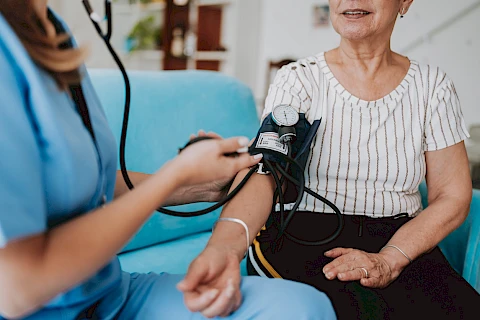
High blood pressure, or hypertension, is a common health concern for seniors that can lead to serious complications if left unmanaged. February is American Heart Month, a time for raising awareness about the risks of hypertension and the steps caregivers can take to support heart health. Understanding the condition and recognizing concerning signs will enable caregivers to take proactive steps in reducing hypertension-related risks and supporting senior well-being.
Hypertension in Seniors
Hypertension is a condition when the blood pressure in the arteries is consistently too high. Several factors like genetics, poor diet, lack of physical activity, and stress can cause it. Seniors are at a higher risk for various reasons, including age-related changes in blood vessels, lifestyle habits, and other medical conditions.
There are misconceptions that high blood pressure is normal with age or that it always causes noticeable symptoms. This can lead to neglecting necessary treatment, making it essential to debunk these myths and focus on accurate information about prevention and management.
Recognizing the Signs and Symptoms
Often dubbed the "silent killer," hypertension can be tricky because its symptoms aren't always obvious. However, early warning signs include frequent headaches, dizziness, or blurry vision. If left untreated, hypertension can lead to severe complications, including heart disease, stroke, and kidney damage. Regular blood pressure monitoring is vital for early detection and management, preventing serious health issues.
Supporting Seniors With Hypertension
Managing hypertension involves several lifestyle changes. A balanced diet rich in fruits, vegetables, whole grains, and lean proteins can make a significant difference. Encourage senior loved ones to reduce salt intake and avoid processed foods.
Regular physical activity, like walking or swimming, is beneficial for maintaining a healthy blood pressure level. Ensure their medications are taken as prescribed and know about their possible side effects. Chronic stress can contribute to high blood pressure. Encourage relaxation techniques such as deep breathing, meditation, or engaging in enjoyable hobbies.
Communication With Healthcare Providers
Prepare for medical appointments by writing down symptoms or changes in your loved one's health. Ask about your loved one’s target blood pressure and what lifestyle changes can further help. If the doctor recommends new treatments or adjustments, clarify any instructions to ensure proper management at home. Remember to schedule routine check-ups to track progress and address any concerns early.
Additional Resources for Caregivers
Websites dedicated to heart health can offer valuable insights and tips for caregivers wanting to learn more about managing hypertension in seniors. Consider joining local support groups to connect with others in similar situations and share experiences. Organizations like the American Heart Association can also provide valuable resources to support you in managing your loved one’s hypertension care.
Support Senior Heart Health With Tailored Care From Senior Helpers
If you’re considering getting additional support at home to focus your efforts on managing your senior loved one’s heart health, Senior Helpers of Middle Tennessee can help. We provide personalized senior home care services in Franklin, Brentwood, Nashville, Columbia, and Lewisburg, including assistance with day-to-day living activities, diet monitoring, meal planning and preparation, and other aspects of elderly care. Reach out to us today to learn more about how we can help!